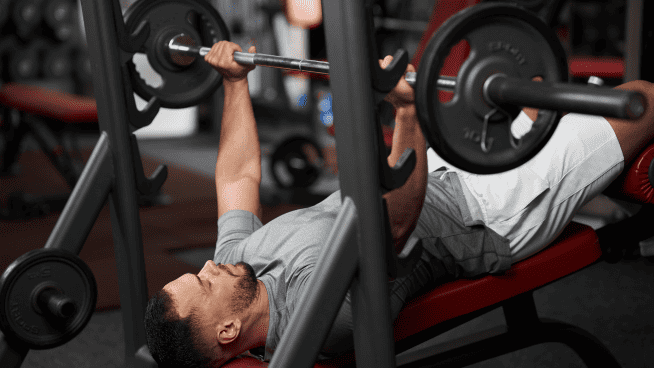Build Muscle: 3 Nutrition Tips
In this series of posts, I am discussing various ways athletes can build muscle, from using strength training principles to getting sufficient sleep. Today, I focus on the importance of nutrition.
A year-round strength training program is incomplete if athletes overlook the important role of nutrition in their muscle development. Below, I share three basic tips that address nutrition’s impact on your sports performance.
1. Make water your primary beverage for building muscle.
Young athletes require more water intake than their non-athletic peers, because their extensive physical activities—sports practices, games and conditioning workouts—make them perspire, creating the need for water replacement. Adequate water intake is essential for circulation and heart health as well as for the healthy functioning of body organs. Water also helps transport fuel to the muscles to aid in recovery and to enhance muscle-building.
A general guideline is to consume six to eight glasses of water per day—plus a sports drink if you are performing long, intense workouts. Water-based fruits and vegetables count as part of daily water intake.
Monitor your urine color to determine if you need to drink more water: pale yellow means you are sufficiently hydrated; yellow to deep yellow denotes inadequate hydration. Dehydration saps your energy for sports and strength training, so drink up.
2. Have a pre- and post-workout meal.
To fuel your workouts, eat a pre-workout meal about one to two hours before exercise, including carbohydrates (e.g., fruit, whole grain cereal) and protein (e.g., yogurt or cheese and nuts). It will give your body the energy source it needs for intense training.
Preferably within 15 to 30 minutes after strength training, take in a post-workout meal with a ratio of four grams of carbohydrate to one gram of protein. For example, to enhance recovery and promote muscle building, eat a banana, a whole wheat bagel and chocolate milk. Consuming carbs after exercise helps replace glycogen stores, the body’s main source of fuel for exercise, while protein supplies the amino acids needed for muscle tissue repair and rebuilding following intense exercise.
3. Athletes need more calories for building muscle.
According to the U.S. Department of Agriculture, young athletes should consume between 3,200 and 3,600 calories per day when trying to build muscle. You can do this by consuming six meals—breakfast, mid-morning snack, lunch, mid-afternoon snack, dinner and pre-bedtime snack. Each meal should contain carbohydrates, protein and essential fats from the basic food groups: fruits, vegetables, whole grain cereals, breads, lean meats, fish, eggs, nuts, seeds, milk and cheese.
Daily Muscle-Building Sample Meals
Breakfast: three hard-boiled eggs, two glasses of milk, two slices of buttered whole grain toast, one orange, handful of almonds (1,030 calories)
Morning snack: raisins, string cheese, almonds (360 calories)
Lunch: two peanut butter and jelly sandwiches, yogurt, banana (700 calories)
Afternoon snack: apple, string cheese, sunflower seeds (330 calories)
Dinner: three pieces of meat, two potatoes, salad (450 calories)
Bedtime snack: oatmeal with milk, raisins and almonds (480 calories)
Photo: 400caloriesorless.com
Jim Carpentier is a certified strength and conditioning specialist, a New Jersey-licensed massage therapist and a health/fitness writer. He currently serves as associate health and wellness director at the Greater Morristown YMCA in Cedar Knolls, N.J.
RECOMMENDED FOR YOU
Build Muscle: 3 Nutrition Tips
In this series of posts, I am discussing various ways athletes can build muscle, from using strength training principles to getting sufficient sleep. Today, I focus on the importance of nutrition.
A year-round strength training program is incomplete if athletes overlook the important role of nutrition in their muscle development. Below, I share three basic tips that address nutrition’s impact on your sports performance.
1. Make water your primary beverage for building muscle.
Young athletes require more water intake than their non-athletic peers, because their extensive physical activities—sports practices, games and conditioning workouts—make them perspire, creating the need for water replacement. Adequate water intake is essential for circulation and heart health as well as for the healthy functioning of body organs. Water also helps transport fuel to the muscles to aid in recovery and to enhance muscle-building.
A general guideline is to consume six to eight glasses of water per day—plus a sports drink if you are performing long, intense workouts. Water-based fruits and vegetables count as part of daily water intake.
Monitor your urine color to determine if you need to drink more water: pale yellow means you are sufficiently hydrated; yellow to deep yellow denotes inadequate hydration. Dehydration saps your energy for sports and strength training, so drink up.
2. Have a pre- and post-workout meal.
To fuel your workouts, eat a pre-workout meal about one to two hours before exercise, including carbohydrates (e.g., fruit, whole grain cereal) and protein (e.g., yogurt or cheese and nuts). It will give your body the energy source it needs for intense training.
Preferably within 15 to 30 minutes after strength training, take in a post-workout meal with a ratio of four grams of carbohydrate to one gram of protein. For example, to enhance recovery and promote muscle building, eat a banana, a whole wheat bagel and chocolate milk. Consuming carbs after exercise helps replace glycogen stores, the body’s main source of fuel for exercise, while protein supplies the amino acids needed for muscle tissue repair and rebuilding following intense exercise.
3. Athletes need more calories for building muscle.
According to the U.S. Department of Agriculture, young athletes should consume between 3,200 and 3,600 calories per day when trying to build muscle. You can do this by consuming six meals—breakfast, mid-morning snack, lunch, mid-afternoon snack, dinner and pre-bedtime snack. Each meal should contain carbohydrates, protein and essential fats from the basic food groups: fruits, vegetables, whole grain cereals, breads, lean meats, fish, eggs, nuts, seeds, milk and cheese.
Daily Muscle-Building Sample Meals
Breakfast: three hard-boiled eggs, two glasses of milk, two slices of buttered whole grain toast, one orange, handful of almonds (1,030 calories)
Morning snack: raisins, string cheese, almonds (360 calories)
Lunch: two peanut butter and jelly sandwiches, yogurt, banana (700 calories)
Afternoon snack: apple, string cheese, sunflower seeds (330 calories)
Dinner: three pieces of meat, two potatoes, salad (450 calories)
Bedtime snack: oatmeal with milk, raisins and almonds (480 calories)
Photo: 400caloriesorless.com
Jim Carpentier is a certified strength and conditioning specialist, a New Jersey-licensed massage therapist and a health/fitness writer. He currently serves as associate health and wellness director at the Greater Morristown YMCA in Cedar Knolls, N.J.











